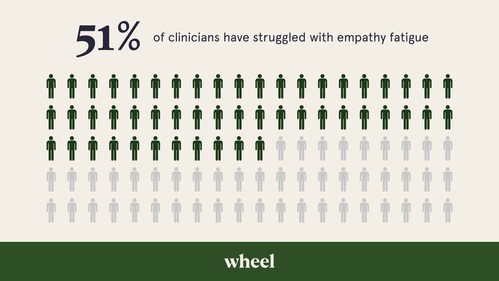/ — Wheel, the health tech company powering the next generation of healthcare, today released a study examining the pandemic’s challenging working conditions for doctors and nurses. The study uncovers a new normal for clinicians: more than half of the nearly 400 doctors and nurse practitioners surveyed admit they’ve lost passion for their career and are struggling to be empathetic towards unvaccinated patients. However the study also found that clinicians are optimistic about the opportunity to treat patients virtually — highlighting a significant shift toward what has typically been an untraditional career path.

Clinicians are struggling with “empathy fatigue”, a long-term side effect of the pandemic
Now that vaccines have been widely available for close to a year, half of clinicians (51%) admitted they’ve struggled to be empathetic with their patients who are eligible but refuse to get the vaccine. An even greater majority (58%) shared they’ve lost passion for their careers because of stress and have considered quitting their job (57%). The study uncovered what’s driving this discontent:
- The burden of COVID-19 misinformation: A crushing 84% of clinicians said they address COVID and/or vaccine misinformation at least weekly. And nearly half (43%) said they address misinformation on a daily basis.
- Waning patient trust: 65% of clinicians believe patients have less trust in medical advice since the pandemic, dwarfing the 15% of clinicians who believe patients have more trust.
“In medical school we’re taught to leave our bias at the door when we enter the patient exam room,” said Pooja AysolaMD, MBA, senior director of clinical operations at Wheel. “The pandemic has put doctors and nurses in the impossible position of upholding that promise while addressing mistrust and misinformation on a weekly or even daily basis. It’s no surprise that many doctors and nurses are starting to question their career path.”
Pre-pandemic challenges remain major threats to patient care
The study uncovers a clear call-to-action for healthcare organizations: burnout and administrative burden are keeping clinicians in crisis mode and directly impacting their ability to provide care to their patients.
- Burned out on burnout: 40% of clinicians believe burnout is the biggest threat to patient care today, surpassing staffing shortages (27%), lack of access to care (17%) and high cost of care (16%).
- One in three clinicians (33%) also believe burnout is the biggest threat to healthcare organizations, beating out other well-reported hazards including financial challenges (28%) and staffing shortages (20%).
- Addressing administrative burden: 50% of clinicians cited administrative burden as the top thing they would change about their jobs if they could, beating out the second-most cited thing – more flexible work schedules (29%).
From skeptic to advocate: clinicians are eager for change and see an opportunity with virtual care
Despite these troubling findings, clinicians are relatively optimistic and even bullish about the future of virtual-first care. Despite lack of interest in telehealth before the pandemic, now two-in-three clinicians (64%) said treating patients in virtual-only or hybrid care settings best fits their lifestyle. Additional findings include:
- Clinicians are confident about the future of virtual primary care: More than half of clinicians (58%) believe we’ll eventually see greater volume of virtual visits for primary care needs than in-person visits.
- The future isn’t too far away: 63% of clinicians believe we’ll see virtual primary care bypass in-person care in the next five years and 33% believe it will take a decade.
- Clinicians are eager to reach patients across state lines: A majority (58%) shared they’re interested in getting licensed in more states.
Clinicians also recognize what could bolster or block widespread virtual care adoption
Despite the optimistic outlook, clinicians realize that the path from traditional brick-and-mortar care to virtual and hybrid care remains in its early stages.
- Education is needed: 76% believe virtual care training should be a core competency taught in medical school and for advanced nursing degrees. Nearly half (46%) felt they weren’t adequately trained in virtual care by their practice or employer.
- All about remote patient monitoring: When asked about what they believe will enable more virtual care adoption, 40% of clinicians said advancements in remote patient monitoring will be critical.
- From temporary to permanent: 77% of clinicians urge policymakers to make permanent the current reimbursement changes created in response to the pandemic.
“For many doctors and nurses, the pandemic has pushed them to take a step back and question or even reconsider their career path,” said Wheel CEO and co-founder Michelle Davey. “By shining a light on the ‘Great Re-examination’ our hope is to provide healthcare organizations with a clear call-to-action. Clinicians are past the point of burnout, but they’re optimistic about what a virtual-first healthcare system could mean for their career.”
See the full survey findings here: https://wheel.com/great-reexamination
About Wheel
Wheel is the health tech company powering the next generation of healthcare. Wheel provides companies and clinicians with everything they need to deliver care virtually. Today Wheel powers virtual-first care for the most forward-thinking organizations in healthcare today — including digital health companies, clinical lab networks, retailers, and tech companies. To learn more about Wheel, visit wheel.com.
Methodology
The survey was conducted by PureSpectrum, an independent market research platform that gathers insights via online, nonprobability samples collected from panels in the PureSpectrum Marketplace. For more information on PureSpectrum’s methodology, visit purespectrum.com.
SOURCE Wheel